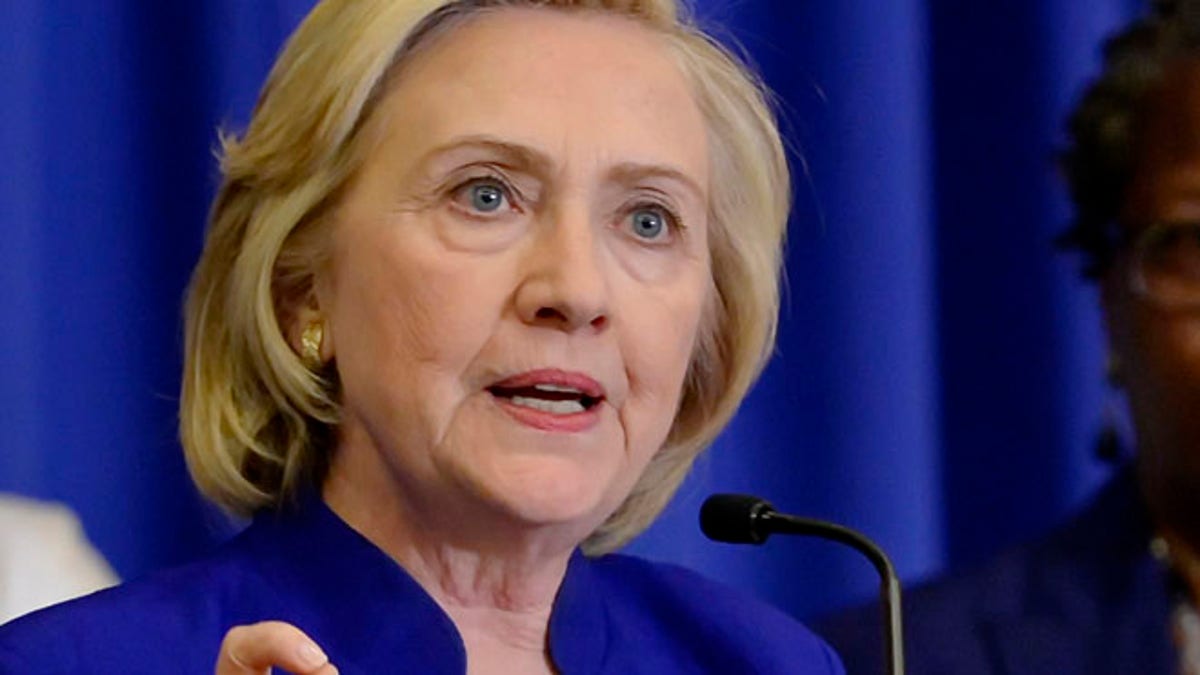
May 27, 2015: Democratic presidential candidate, former Secretary of State Hillary Rodham Clinton speaks in Columbia, S.C. (AP)
This week marks the 26th anniversary of the Tiananmen Square Massacre, in which China’s government crushed students protesting peacefully for freedom and accountable government. Since that time, Americans have consistently held an unfavorable view of China. They perceive what former Secretary of State Hillary Clinton seemingly does not: that Beijing threatens not only its own people, but us as well. These dual threats go hand-in-hand.
The Soviet dissident Andrei Sakharov often said that “a country that does not respect the rights of its own people will not respect the rights of its neighbors.” True to this maxim, China’s repressive government announced last month a shift from a defensive to an offensive military posture. It claimed that war with the United States was “inevitable” unless we and our allies accept China’s attempts to dominate the South China Sea, upon which much international commerce relies. Beijing won’t stop there either.
China has recently begun building artificial islands in disputed waters and fortifying them with weapons. Beijing’s officials muse openly about excluding the United States from the Western Pacific. We have used our naval supremacy to guarantee freedom of navigation for all—including our adversaries’ commerce. Would the Chinese government—which also sanctions economic espionage and cyber war against America—be so magnanimous?
The die was cast for the Obama administration’s relationship with China by Hillary Clinton. In her inaugural trip to China as Secretary of State, Hillary said that raising human rights concerns could not be allowed to interfere with the “climate change crisis,” among other supposed emergencies. Later, she misled and pressured a blind dissident to leave our embassy in Beijing so that a pointless summit with China’s leaders didn’t broach uncomfortable issues. The dissident’s crime: helping abused Chinese women.
Hillary asserted that “a thriving China is good for America,” a statement most Americans would doubt in China’s current form.
She also announced a military “pivot” to Asia, but followed through with about as much seriousness as her boss’s ephemeral “red line” in Syria.
Hillary’s opponents are already adding China to her list of failures. Wisconsin Gov. Scott Walker, a likely GOP presidential candidate, recently said that the pivot was “entirely hollow” and the Chinese “have noticed and acted accordingly.” He called instead for “restoring America’s military strength, [and] reinforcing our existing alliances.” We can only hope.
Meanwhile, Beijing knew it was dealing with a weak counterpart. Furthermore, this was part of a pattern for Hillary. When Iranians took to the streets peacefully in 2009 to protest their oppressive Islamist regime, Hillary’s silence was deafening. She also kept quiet when those protesters met the same lamentable fate as their equals in Tiananmen a generation before. Later, Hillary blithely reasoned that American moral support “would discredit the movement.”
Surely the tyrants would make that case—they always do. But if Hillary ever truly bothered to consult those who could change the future paths of China or Iran or Russia—and make the world safer in so doing—she would learn that American and allied support is crucial to the success of any freedom movement.
Freedom did not prevail at Tiananmen Square in 1989, but it swept Central Europe that year, liberating millions and turning adversaries in to allies. All of the leaders of those movements said that attention given to their plight by American leaders was essential. Freedom movements succeed when there is a critical mass created by internal opponents of a dangerous regime and foreign leaders willing to spotlight their cause and confront their oppressors.
Hillary did the opposite. The diffidence she showed Beijing and Tehran was a precursor of her profound incompetence during the Arab Spring. From Libya to Syria, she failed to cultivate secular-leaning forces, whether political or military. She started a dialogue with the Muslim Brotherhood—known in Gaza as Hamas—and later sided with them against non-Islamist forces in Egypt. No person did more than Hillary to turn the Arab Spring into a tale of woe. America needed a cunning, pro-freedom political warrior and instead got a celebrity—someone who has made the mistake of taking literally Woody Allen’s adage that “eighty percent of success is showing up.”
Hopefully America’s next administration has cabinet members who understand that success is something that is achieved—not the byproduct of attendance and a pulse. Hopefully they also understand that we need to deter Beijing with a rebuilt military, and champion not China’s government, but its people. Their freedom would replace a tyranny that chooses to antagonize its neighbors in order to manufacture a patina of legitimacy. They have waited 26 years since Tiananmen. For their sake—and ours—let’s hope they don’t have to wait much longer.








































